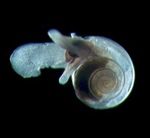

Rising ocean acidity off Washington state threatens shellfish, panel says
SEATTLE — Rising acidity levels in the oceans pose a serious threat to shellfish and other marine life, and tackling that problem in Washington state will require reducing carbon dioxide emissions, keeping polluted runoff out of marine waters, and increasing monitoring at hatcheries, a group of experts recommended Tuesday.
The panel of scientists and policy







